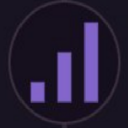-
 Bitcoin
Bitcoin $88,629.0112
1.53% -
 Ethereum
Ethereum $1,633.3416
0.24% -
 Tether USDt
Tether USDt $1.0000
0.01% -
 XRP
XRP $2.0979
-1.08% -
 BNB
BNB $605.5535
0.62% -
 Solana
Solana $140.2764
0.66% -
 USDC
USDC $1.0000
0.01% -
 Dogecoin
Dogecoin $0.1643
1.41% -
 TRON
TRON $0.2438
0.47% -
 Cardano
Cardano $0.6391
-0.43% -
 Chainlink
Chainlink $13.4401
-0.21% -
 Avalanche
Avalanche $20.3874
-0.96% -
 UNUS SED LEO
UNUS SED LEO $8.8373
-2.11% -
 Stellar
Stellar $0.2496
-3.26% -
 Sui
Sui $2.3313
3.08% -
 Shiba Inu
Shiba Inu $0.0...01260
-0.18% -
 Hedera
Hedera $0.1732
1.55% -
 Toncoin
Toncoin $2.9117
-3.34% -
 Bitcoin Cash
Bitcoin Cash $346.5808
1.81% -
 Hyperliquid
Hyperliquid $18.4964
3.15% -
 Litecoin
Litecoin $79.8162
-0.77% -
 Polkadot
Polkadot $3.7801
-3.27% -
 Dai
Dai $1.0000
0.00% -
 Bitget Token
Bitget Token $4.4558
-0.32% -
 Ethena USDe
Ethena USDe $0.9992
0.01% -
 Pi
Pi $0.6369
0.62% -
 Monero
Monero $217.7312
1.28% -
 Pepe
Pepe $0.0...08147
2.99% -
 Uniswap
Uniswap $5.4346
0.09% -
 Aptos
Aptos $4.9660
-4.00%
How does a blockchain DAO work?
A blockchain DAO uses smart contracts to automate governance and decision-making, offering transparency and decentralization but facing challenges like security and scalability.
Apr 13, 2025 at 12:43 am

A blockchain Decentralized Autonomous Organization (DAO) is a revolutionary concept that leverages blockchain technology to create a new form of organizational structure. Unlike traditional organizations, a DAO operates without a central authority, relying instead on smart contracts to automate decision-making and governance. This article will delve into the mechanics of a blockchain DAO, exploring how it functions, its key components, and the processes involved in its operation.
What is a Blockchain DAO?
A blockchain DAO is an entity that exists on a blockchain and is governed by smart contracts. These smart contracts are self-executing programs that automatically enforce the rules and execute decisions based on the consensus of its members. The primary goal of a DAO is to operate transparently and autonomously, with all actions recorded on the blockchain for public verification.
Key Components of a Blockchain DAO
The foundation of a blockchain DAO is built on several key components:
Smart Contracts: These are the backbone of a DAO, defining the rules, governance, and operational logic. They are coded to execute automatically when certain conditions are met, ensuring that the DAO operates as intended without human intervention.
Tokens: Most DAOs use tokens to represent ownership or voting rights. These tokens are often issued during an Initial Coin Offering (ICO) or through other means, allowing members to participate in the governance of the DAO.
Governance Mechanism: This is the process through which decisions are made within the DAO. It typically involves voting by token holders, where proposals are submitted, and members vote on them using their tokens.
Treasury: A DAO often has a treasury, which is a pool of funds managed by the smart contracts. These funds can be used for various purposes, such as funding projects or rewarding contributors.
How a Blockchain DAO Operates
The operation of a blockchain DAO involves several steps and processes that ensure its smooth functioning:
Proposal Submission: Any member of the DAO can submit a proposal for consideration. This could be a new project, a change in governance rules, or any other action that requires the DAO's attention. The proposal is submitted through the DAO's interface, which is typically a decentralized application (dApp) on the blockchain.
Voting Process: Once a proposal is submitted, it enters the voting phase. Token holders can cast their votes based on the number of tokens they hold. The voting period is predefined in the smart contracts, and once it concludes, the results are tallied automatically.
Execution of Decisions: If a proposal receives the required number of votes, it is executed automatically by the smart contracts. For example, if the proposal is to fund a new project, the necessary funds are transferred from the treasury to the designated recipient.
Transparency and Accountability: All actions and transactions within the DAO are recorded on the blockchain, ensuring transparency and accountability. Members can audit the DAO's activities at any time, fostering trust and confidence in its operations.
Benefits of a Blockchain DAO
The use of a blockchain DAO offers several advantages over traditional organizational structures:
Decentralization: By eliminating the need for a central authority, a DAO empowers its members to have a direct say in its governance and operations. This leads to a more democratic and inclusive decision-making process.
Automation: Smart contracts automate many of the DAO's functions, reducing the need for manual intervention and minimizing the risk of human error or corruption.
Transparency: Since all actions are recorded on the blockchain, members have full visibility into the DAO's activities, enhancing trust and accountability.
Flexibility: DAOs can be designed to suit various purposes, from managing investment funds to coordinating decentralized projects. This flexibility allows them to adapt to different needs and objectives.
Challenges and Considerations
While blockchain DAOs offer significant benefits, they also come with challenges and considerations that need to be addressed:
Security: The smart contracts that govern a DAO must be thoroughly audited to prevent vulnerabilities that could be exploited by malicious actors. The infamous DAO hack of 2016, where millions of dollars were stolen, underscores the importance of security in DAO operations.
Legal and Regulatory Compliance: The legal status of DAOs varies by jurisdiction, and navigating the regulatory landscape can be complex. DAOs must ensure compliance with applicable laws to avoid legal issues.
Scalability: As DAOs grow, they may face challenges in scaling their operations and maintaining efficiency. Ensuring that the governance mechanism remains effective as the number of members increases is crucial.
Participation: Encouraging active participation from members is essential for the success of a DAO. Low voter turnout can lead to decisions that do not reflect the collective will of the community.
Examples of Blockchain DAOs
To better understand how blockchain DAOs work in practice, let's look at a few examples:
The DAO: Launched in 2016, The DAO was one of the first and most high-profile examples of a blockchain DAO. It aimed to operate as a decentralized investment fund, allowing token holders to vote on investment proposals. Despite its eventual downfall due to a security breach, The DAO highlighted the potential and challenges of this new organizational model.
Aragon: Aragon is a platform that enables the creation and management of DAOs. It provides tools for governance, treasury management, and more, making it easier for organizations to adopt a decentralized structure.
MakerDAO: MakerDAO is a decentralized lending platform that uses a DAO to govern its operations. Token holders vote on critical decisions, such as interest rates and collateral types, ensuring that the platform remains aligned with the community's interests.
Frequently Asked Questions
Q: Can anyone join a blockchain DAO?
A: It depends on the specific DAO. Some DAOs are open to anyone who holds their tokens, while others may have more stringent membership criteria. Always check the DAO's governance rules to understand the requirements for joining.
Q: How are disputes resolved within a blockchain DAO?
A: Dispute resolution in a DAO can vary, but it often involves a voting process where members decide on the best course of action. Some DAOs may also use external arbitration services or have built-in mechanisms for resolving conflicts within their smart contracts.
Q: What happens if a proposal fails to pass in a DAO?
A: If a proposal fails to receive the required number of votes, it is not executed. The DAO continues to operate as before, and members can submit new proposals or revisit the failed one in the future.
Q: Are there any costs associated with participating in a DAO?
A: Yes, participating in a DAO can involve costs, such as transaction fees for voting or submitting proposals. These fees are typically paid in the blockchain's native cryptocurrency, such as Ethereum's gas fees.
Disclaimer:info@kdj.com
The information provided is not trading advice. kdj.com does not assume any responsibility for any investments made based on the information provided in this article. Cryptocurrencies are highly volatile and it is highly recommended that you invest with caution after thorough research!
If you believe that the content used on this website infringes your copyright, please contact us immediately (info@kdj.com) and we will delete it promptly.
- From a Coin That Wasn't Supposed to Exist to Another That Got Melted Down
- 2025-04-22 21:00:12
- 3 Cryptos to Buy Now Before Parabolic Gains Hit
- 2025-04-22 21:00:12
- Coinbase Derivatives launches XRP-Future contracts, approved by the American Commodity Futures Trading Commission (CFTC)
- 2025-04-22 20:55:13
- Amp (AMP) price prediction: Can this token continue its bullish run?
- 2025-04-22 20:55:13
- Trump Establishes a Limited Bitcoin Strategic Reserve via Executive Order
- 2025-04-22 20:50:12
- Meme Coin Did Not Ruin This Cycle, But Instead Accelerated the Maturity of the Industry as a Market Catalyst
- 2025-04-22 20:50:12
Related knowledge
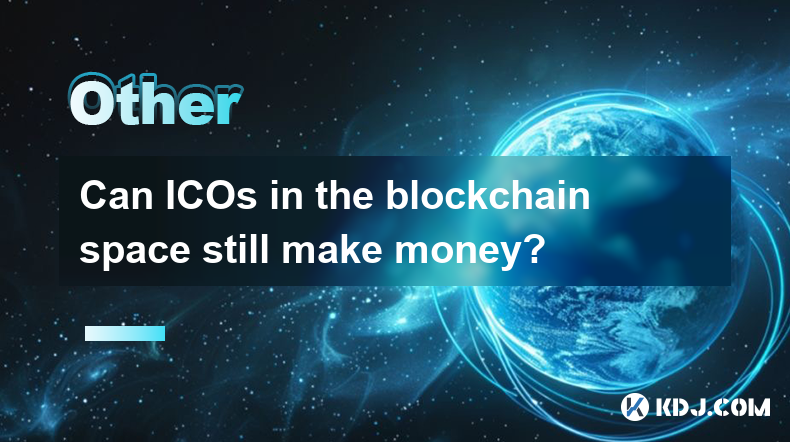
Can ICOs in the blockchain space still make money?
Apr 17,2025 at 08:29pm
The landscape of Initial Coin Offerings (ICOs) in the blockchain space has evolved significantly since their peak in 2017 and 2018. Despite the increased regulatory scrutiny and the rise of alternative fundraising methods like Security Token Offerings (STOs) and Initial Exchange Offerings (IEOs), ICOs can still be a viable way to raise funds and generat...
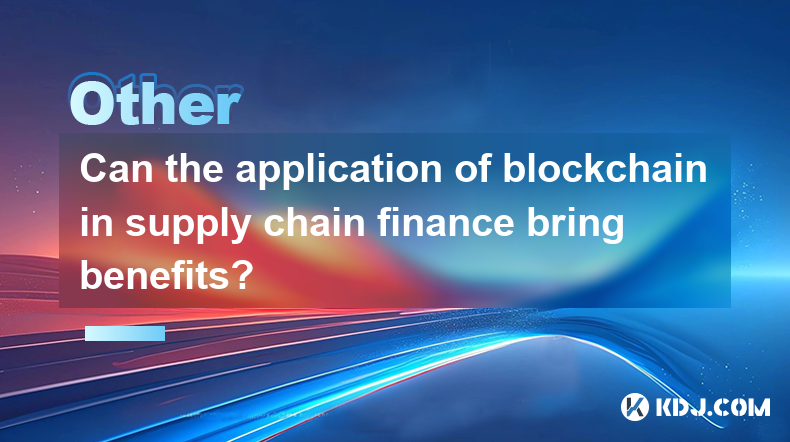
Can the application of blockchain in supply chain finance bring benefits?
Apr 15,2025 at 04:00pm
Can the application of blockchain in supply chain finance bring benefits? The integration of blockchain technology into supply chain finance has garnered significant attention in the cryptocurrency and financial sectors. This article explores how blockchain can potentially revolutionize supply chain finance, detailing its benefits and providing a compre...

Does the ranking of Chinese blockchain apps include cross-chain applications?
Apr 14,2025 at 04:00pm
The ranking of Chinese blockchain apps is a comprehensive evaluation that takes into account various aspects such as user base, transaction volume, and technological innovation. A pertinent question arises regarding whether these rankings include cross-chain applications. Cross-chain applications, which allow different blockchain networks to interact an...
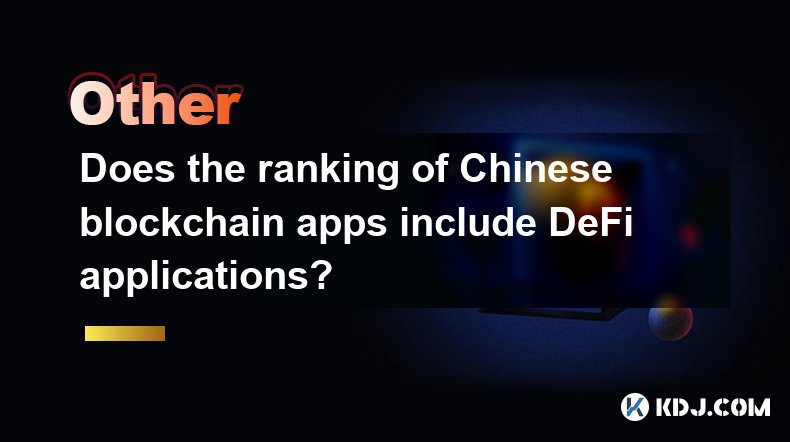
Does the ranking of Chinese blockchain apps include DeFi applications?
Apr 15,2025 at 06:57am
The ranking of Chinese blockchain apps is a comprehensive list that showcases the most popular and influential applications within the cryptocurrency ecosystem. One question that often arises is whether these rankings include DeFi applications. To answer this, we need to delve into the specifics of how these rankings are compiled and what types of appli...
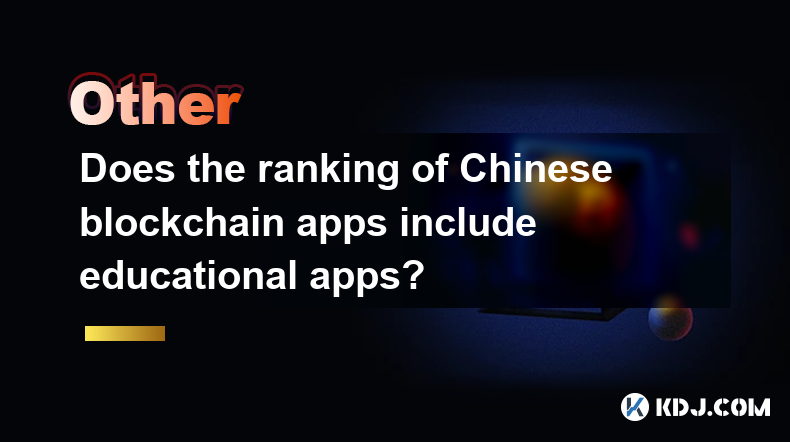
Does the ranking of Chinese blockchain apps include educational apps?
Apr 16,2025 at 03:35am
The ranking of Chinese blockchain apps often includes a variety of categories, from finance and gaming to social networking and beyond. One question that frequently arises is whether these rankings include educational apps. To address this, we need to delve into the specifics of how blockchain apps are categorized and ranked in China, and whether educat...
Does the ranking of Chinese blockchain apps include enterprise-level applications?
Apr 15,2025 at 06:42am
The ranking of Chinese blockchain apps often includes a variety of applications, ranging from consumer-focused to enterprise-level solutions. Understanding the scope and criteria for these rankings is essential to determine if enterprise-level applications are included. This article delves into the specifics of how Chinese blockchain app rankings are co...

Can ICOs in the blockchain space still make money?
Apr 17,2025 at 08:29pm
The landscape of Initial Coin Offerings (ICOs) in the blockchain space has evolved significantly since their peak in 2017 and 2018. Despite the increased regulatory scrutiny and the rise of alternative fundraising methods like Security Token Offerings (STOs) and Initial Exchange Offerings (IEOs), ICOs can still be a viable way to raise funds and generat...

Can the application of blockchain in supply chain finance bring benefits?
Apr 15,2025 at 04:00pm
Can the application of blockchain in supply chain finance bring benefits? The integration of blockchain technology into supply chain finance has garnered significant attention in the cryptocurrency and financial sectors. This article explores how blockchain can potentially revolutionize supply chain finance, detailing its benefits and providing a compre...

Does the ranking of Chinese blockchain apps include cross-chain applications?
Apr 14,2025 at 04:00pm
The ranking of Chinese blockchain apps is a comprehensive evaluation that takes into account various aspects such as user base, transaction volume, and technological innovation. A pertinent question arises regarding whether these rankings include cross-chain applications. Cross-chain applications, which allow different blockchain networks to interact an...

Does the ranking of Chinese blockchain apps include DeFi applications?
Apr 15,2025 at 06:57am
The ranking of Chinese blockchain apps is a comprehensive list that showcases the most popular and influential applications within the cryptocurrency ecosystem. One question that often arises is whether these rankings include DeFi applications. To answer this, we need to delve into the specifics of how these rankings are compiled and what types of appli...

Does the ranking of Chinese blockchain apps include educational apps?
Apr 16,2025 at 03:35am
The ranking of Chinese blockchain apps often includes a variety of categories, from finance and gaming to social networking and beyond. One question that frequently arises is whether these rankings include educational apps. To address this, we need to delve into the specifics of how blockchain apps are categorized and ranked in China, and whether educat...

Does the ranking of Chinese blockchain apps include enterprise-level applications?
Apr 15,2025 at 06:42am
The ranking of Chinese blockchain apps often includes a variety of applications, ranging from consumer-focused to enterprise-level solutions. Understanding the scope and criteria for these rankings is essential to determine if enterprise-level applications are included. This article delves into the specifics of how Chinese blockchain app rankings are co...
See all articles





















































































